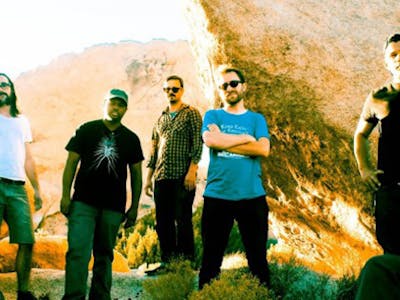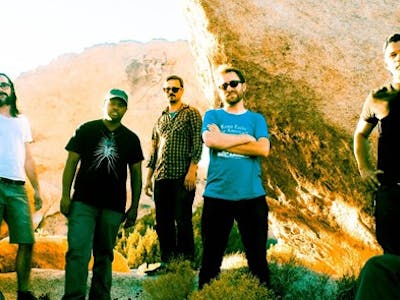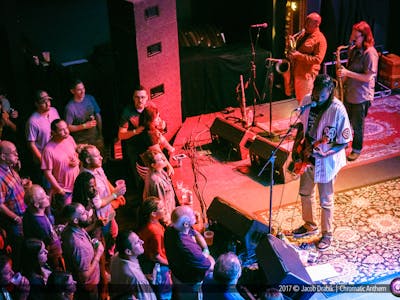Anatomy texts might not show it, but the greatest soul and blues music leaves no doubt that the hip bone is directly connected to the heart -- a fact that’s driven home in every note laid down by Black Joe Lewis and the Honeybears. As they prove on their Lost Highway debut, Tell ‘Em What Your Name Is, the Austin-based combo has the kind of gritty attitude and deliciously greasy groove-consciousness that’d pass muster in the toughest juke joint.To paraphrase Ike and Tina Turner, Tell ‘Em
Read More
Anatomy texts might not show it, but the greatest soul and blues music leaves no doubt that the hip bone is directly connected to the heart -- a fact that’s driven home in every note laid down by Black Joe Lewis and the Honeybears. As they prove on their Lost Highway debut, Tell ‘Em What Your Name Is, the Austin-based combo has the kind of gritty attitude and deliciously greasy groove-consciousness that’d pass muster in the toughest juke joint.
To paraphrase Ike and Tina Turner, Tell ‘Em What Your Name Is gives Lewis the chance to play nice and easy as well as nice and rough. He and his bandmates take the latter route more often -- as on the fiery, brass-laced opener “Gunpowder” and the unabashedly horndog anthem “Big Booty Woman.” But there’s far more than one trick up their collective sleeve, as borne out by the dark New Orleans march “Master Sold My Baby.”
“It’s weird…people say I come up with all these different kinds of songs, and I guess that’s true, but they all just come out naturally,” says Lewis, who cites James Brown and Lightnin’ Hopkins as two of his bigger influences. “If I sit down and try to write a song, it just sounds contrived. All the songs on this record, I just made up as I went along. I couldn’t do a lot of ‘em again if I didn’t have ‘em on tape.”
That from-the-gut stream-of-consciousness permeates the disc, with Lewis wailing wildly -- in a voice that’s one part Joe Tex, one part Tyrone Davis -- through sweat-soaked offerings like the gutbucket “I’m Broke” and “Please, Part Two” as his bandmates turn up the heat, taking a low simmer to a full boil with turn-on-a-dime precision.
“The thing about the band is that we play with each other, not against each other,” says Honeybears’ guitarist Zach Ernst. “It’s not a pissing contest, the way it is in some bands. We communicate with each other without speaking, and I think that has a lot to do with Joe’s attitude -- he has an amazing ability to just draw people in. For a lot of people, the blues is a museum piece, but Joe brings it into the moment.”
If not for a twist of fate, Lewis might never have gotten up on stage at all. Growing up in the small town of Round Rock, Texas, he was more likely to be found on the football field than in the band room -- but landing a job in an Austin pawn shop put him at a (shall we say) crossroads in life.
“My dad and my uncles listened to soul and blues when I was a kid, but I never really took much notice,” says Lewis. “When I was about 19 or 20, I was working in this pawn shop and all these guys would bring in guitars. One day, I started playing around with one and took it home and started teaching myself how to play.”
Buoyed by the encouragement of friends, Lewis soon gravitated to the fertile open mic scene of his adopted hometown, where he performed as a solo artist, a period he now laughingly recalls as “horrible…I was usually too drunk or too scared to put on a good show, but people kept asking me to come back.”
While he eventually put together a band with a solid lineup, Lewis couldn’t capture the mojo he was looking for and was seriously considering retiring from music in his mid-twenties -- until Ernst entered the picture.
“I was on the [University of Texas] programming board and we’d booked Little Richard to do a show and I immediately thought of Joe,” says the guitarist. “I heard he was down on music and was woking at a restaurant shucking oysters, so I approached him as a fan -- and Joe ended up playing the show with his old band.”
The plea worked, the gig was explosive, but also a partnership was born. Shortly after that gig, Zach formed a band around Joe and the rough and ready Honeybears’ were born. Four weeks later, Black Joe Lewis & The Honeybears played their first gig. Their stylings quickly drew attention from local tastemakers -- like the Austin Chronicle, which marveled at the singer’s ability to “spit lyrics in short bursts of aggression like bricks at glass windows” -- and fellow musicians like Okkervil River and Spoon, both of which tapped him and the Honeybears to hit the road as an opening act.
“Joe‘s a really special, really natural performer,” says Spoon drummer Jim Eno, who thought enough of the band to lend his production skills to the new disc. “We were able to do about 75-percent of the album live, and that’s something you very, very rarely do.”
The spontaneity was immediately evident on the Honeybears’ self-titled EP -- which spotlighted the band’s controversial, tongue-in-cheek concert staple “Bitch, I Love You” -- and is even more at the fore of Tell ‘Em What Your Name Is. To hear Lewis tell it, however, they’ve only scratched the surface of what they’re capable of.
“The way I look at it, I have to step my game up every day,” he says. “I look at it as a challenge. It’s great that we’ve gotten noticed, but we’ve got to keep those people interested and bring more people in. If you don’t keep moving forward, nobody’s gonna care -- and I’m gonna make sure people really care about this band.”




